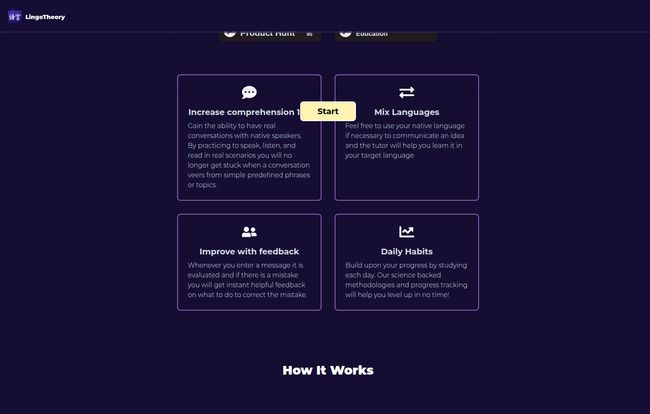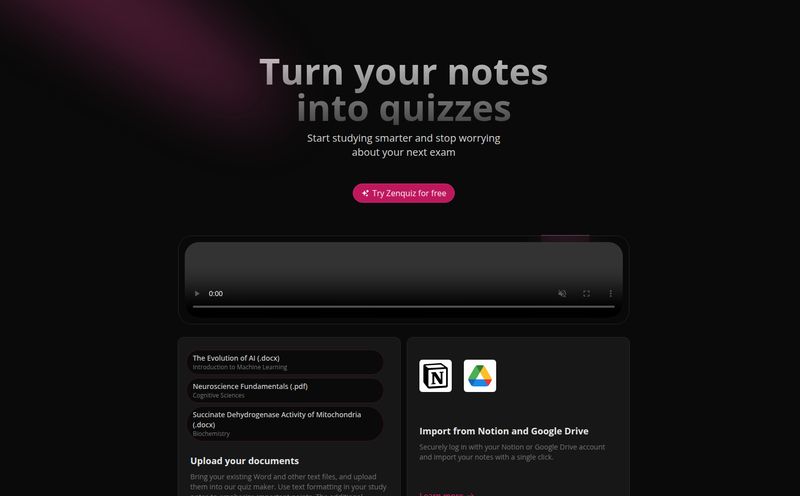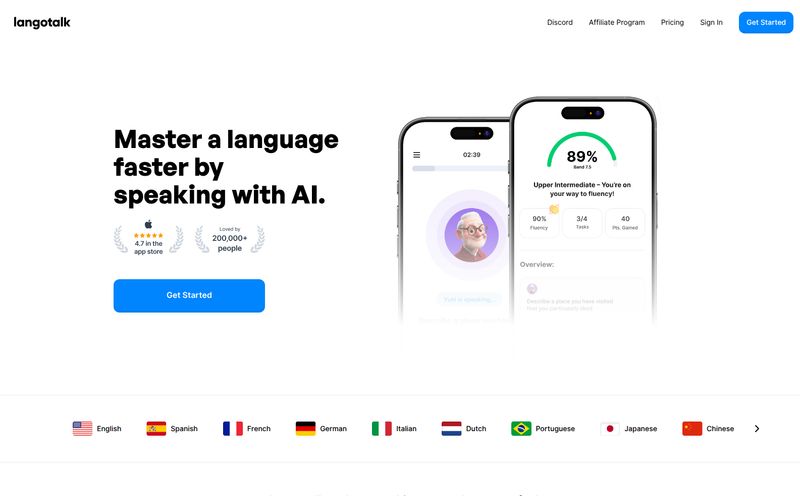The hardest part of learning Mandarin Chinese isn’t the characters. It’s not even the tones, though my early attempts probably sounded like a confused cat. The real beast, the final boss of fluency, is conversation. It’s that terrifying gap between knowing a word and actually using it with a real, live human who is patiently waiting for you to finish your sentence.
For years, the solution was either moving to the country, finding a pricey tutor, or endlessly swiping through language exchange apps hoping to find a partner who didn't just want to talk about the weather. But now, there’s a new wave of tools powered by AI that promise a different path. One of the newer kids on this block is LingoTheory AI. It claims to be an AI tutor you can have daily conversations with. A bold claim. So, as someone who’s been wrestling with Mandarin for years and is perpetually fascinated by traffic-driving tech, I had to see if it was legit.
What Exactly is LingoTheory Ai?
At its heart, LingoTheory isn't another Duolingo or a fancy flashcard app (though its mobile app does have flashcards). Think of it more like a dedicated sparring partner for your brain. Its main purpose is to simulate real conversations in Mandarin to get you comfortable with speaking and reacting on the fly. You're not just picking from a list of three canned responses. You're typing or speaking freely, and a surprisingly smart AI chats right back with you.
The whole idea is to get you out of “textbook mode” and into “real world mode.” It aims to build your comprehension by putting you in everyday scenarios, letting you stumble, and then helping you get back up. It’s a pretty cool concept that directly targets the biggest pain point for most intermediate learners.

Visit LingoTheory Ai
My First Impressions and The Core Experience
Firing up the web app, the interface is clean. Dark mode, which my eyes appreciate. The core loop is simple: the AI gives you a prompt, and you respond. One of the first things that stood out to me is the “Mix Languages” feature. You can literally type a response in English, and it will understand your intent and reply in perfect Mandarin, showing you how you could have said it. That's a fantastic bridge for beginners who know what they want to say but don't yet have the vocabulary.
The instant feedback is the other pillar of the experience. Made a grammar mistake? The AI gently points it out. Used the wrong measure word? It’ll correct you. This is something I've always wanted. It’s like having a tutor who isn't afraid to interrupt you, but because it’s an AI, there’s zero social anxiety or embarrassment. You just learn and move on. No judgement.
They also talk a big game about building “Daily Habits,” which is a smart move. We all know consistency is everything in language learning. The platform tracks your progress, encouraging you to come back each day. It’s a small psychological nudge, but in my experience, that’s often the difference between a learning tool that gets used and one that just collects digital dust.
The Good Stuff That Actually Works
After playing around with it for a while, a few things really started to shine. It wasn’t all just marketing fluff.
The Magic of Realistic Conversation
This is the tool's biggest win. I’ve used other bots that feel… well, robotic. They can’t handle deviation from the script. LingoTheory feels more fluid. It adapts to what you’re saying, creating a more natural conversational flow. You can ask it questions, go on tangents, and it generally keeps up. This is a massive step up from the rigid, pre-defined dialogues we're all used to.
Instant Feedback Without the Awkwardness
I mentioned this before, but it's worth repeating. Getting corrected by a human can sometimes sting. You feel slow, you feel foolish. The AI strips all that away. The feedback is immediate, objective, and non-judgmental. This creates a safe space to fail, and failing is honestly the fastest way to learn a language. It’s a low-stakes environment to make high-stakes progress.
A Surprisingly Good Mobile App and Web Version
I love that there's a free web version that’s fully functional. You don't have to download anything to get started. But they also have a mobile app, which is a smart ecosystem play. The app incorporates flashcards along with the AI tool, making it a more well-rounded study companion for when you're on the go. It’s a solid one-two punch.
Where LingoTheory Needs a Bit More Schooling
Okay, it's not perfect. No tool is. And in the spirit of a real, honest review, there are a few things you should be aware of. These aren't necessarily deal-breakers, but you need to go in with your eyes open.
The Mandarin-Only Focus (For Now)
Right now, LingoTheory is a one-trick pony. It does Simplified Mandarin Chinese, and that's it. If you're learning Japanese, Spanish, or even Traditional Chinese, you're out of luck. The email sign-up on their site hints that new features and languages are on the way, but for today, it’s a specialized tool for a specific audience.
A Word of Caution on Pinyin and Explanations
This is probably the most important caveat. The developers are upfront that the pinyin feature can sometimes be inaccurate. Same goes for some of the AI’s grammatical explanations. In my testing, it was mostly fine, but I did spot a few oddities. My advice? Use LingoTheory for what it's best at: conversation practice. But dont throw out your trusty Pleco dictionary or grammar guide. Use them together. Cross-reference the AI's suggestions, especially if something feels off.
The Quirks of AI
Like any generative AI, you can sometimes get it to go off the rails if you try hard enough. I'm sure someone has already “jailbroken” it to talk about something silly. It's a fun distraction, but just be aware that the AI, while smart, is not infallible. It’s a language model, not a sentient being with a deep understanding of Chinese culture.
What About the Price Tag?
This is the part of the review where I usually break down the subscription tiers and tell you if the premium version is worth it. So, naturally, I went looking for the pricing page. And I hit… a 404 error. That's right, a “page not found.”
As far as I can tell, and based on my use of the platform, the LingoTheory AI web tool is currently free to use. There’s no paywall, no credit card required to start chatting. This is amazing, but also makes me think they're in an early-access or beta phase. The call-to-action to sign up for updates on their homepage strongly suggests that a pricing model might be introduced down the line. My advice? Get in now while the getting is good.
Who is LingoTheory Actually For?
So, should you use it? It depends on who you are.
- For Absolute Beginners (HSK 1): It can be a helpful tool, especially with the “mix languages” feature. It shows you what correct sentences look like. But it shouldn't be your only tool. You still need a foundational course to teach you the absolute basics.
- For Lower-Intermediate Learners (HSK 2-3): This is the sweet spot. You know some words, you have some grammar, but you’re terrified of speaking. LingoTheory is perfect for you. It will absolutely help you bridge the gap between passive knowledge and active use.
- For Advanced Learners (HSK 4+): It can still be a fun way to practice and maintain your skills, but you might find yourself pushing the AI's limits more often. It's a great tool for a quick daily warm-up.
Think of it this way: LingoTheory isn’t a classroom. It’s the homework and practice field. You still need the coach and the playbook, but this is where you run the drills until they become second nature.
Frequently Asked Questions about LingoTheory
Is LingoTheory AI really free?
For now, yes! The web version seems to be completely free to use. They do have an email list to notify users of future updates, which may include a pricing plan someday. But for now, you can chat with the AI at no cost.
Can it actually help my Mandarin pronunciation?
Indirectly. While it has voice input, its main strength is in conversation flow, grammar, and vocabulary. It will recognize your speech, but it’s not designed as a dedicated pronunciation coach that gives you detailed feedback on your tones like some other specialized apps. It helps you practice speaking, which in turn improves pronunciation, but it's not its primary function.
How does the Pinyin toggle work?
There's an option to show or hide pinyin for the AI's responses. This is great for weaning yourself off of relying on it. You can try reading the characters first, and then toggle the pinyin on to check yourself. Just remember the occasional inaccuracies I mentioned earlier!
Is LingoTheory a good tool for absolute beginners?
It's a good supplementary tool. I wouldn't recommend it as your one and only resource if you're starting from zero. You need a structured course for the fundamentals. But using LingoTheory alongside that course from day one could definitely speed up your progress and build confidence.
What's the difference between the app and the website?
The core AI conversation tool is on both. The main difference is that the mobile app also includes a flashcard system, making it more of an all-in-one study tool for on-the-go learning.
My Final Verdict on LingoTheory AI
So, is LingoTheory AI the magic bullet that will make you fluent in Mandarin overnight? No, of course not. Such a thing doesn't exist. But is it a powerful, innovative, and genuinely useful tool that solves one of the biggest problems in language learning? Absolutely.
It’s a fantastic supplementary resource. It won't replace your teacher or your grammar textbook, but it will be the best conversation partner you've ever had—one that’s available 24/7, never gets tired, and doesn't care how many mistakes you make. For the intermediate learner stuck in a rut, this tool could be a complete game-changer. And since it's currently free, there is literally no reason not to give it a try.
The future of language learning is going to be fascinating, and tools like LingoTheory are leading the charge. It feels like we're just scratching the surface of what AI can do for us learners. It’s an exciting time.
Reference and Sources
- LingoTheory Official Website
- For more on the importance of active recall in language learning, I always recommend looking into studies on spaced repetition and retrieval practice. A great primer is the work of Hermann Ebbinghaus and the modern applications of his forgetting curve.



